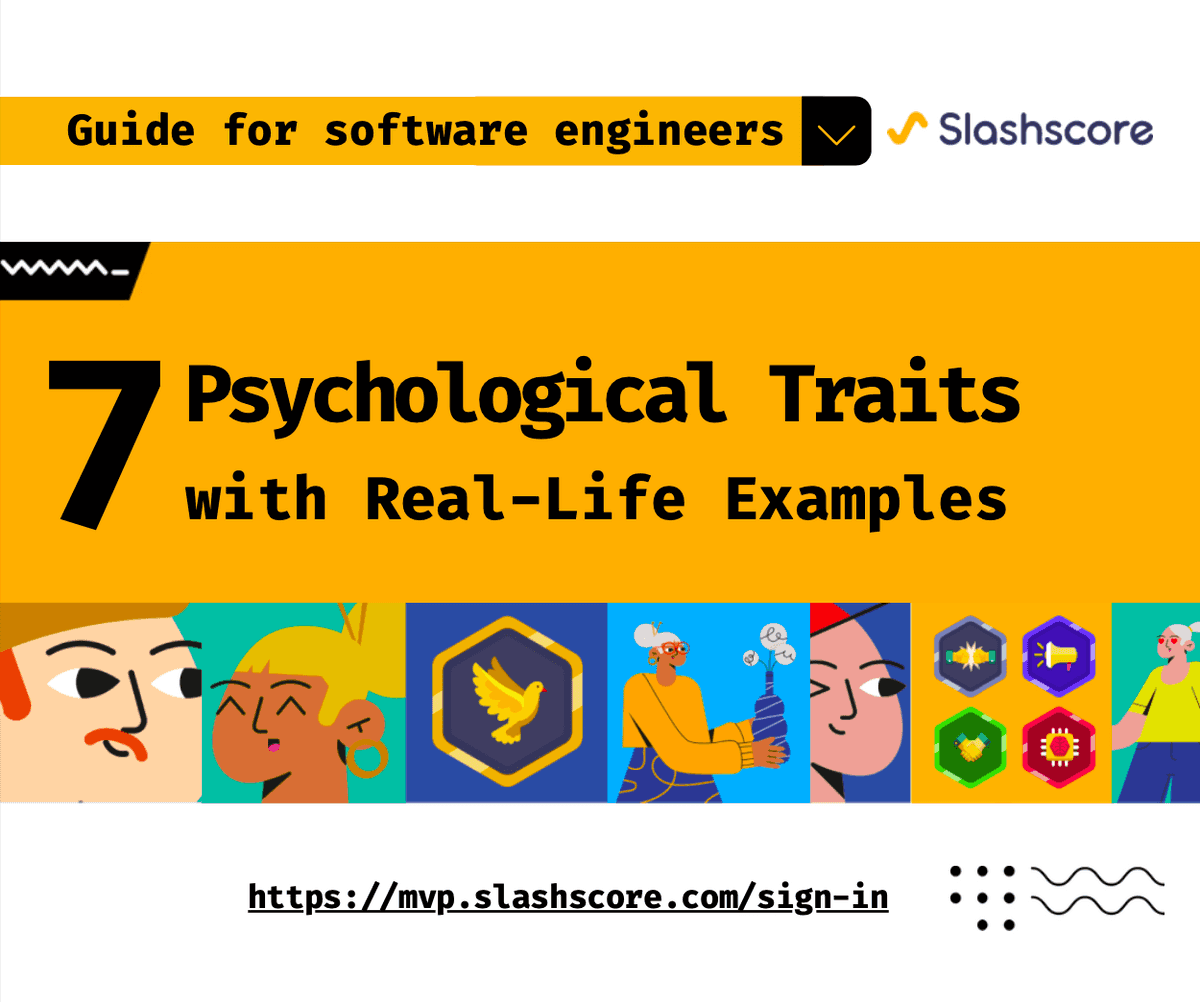
Developers
7 Key Psychological Traits of Exceptional Software Engineers
Discover the 7 key psychological traits of exceptional software engineers.
Author: Corina Craescu
Posted on: May 24, 2023
Summary
5 min. read
Introduction
Improving your psychological traits is critical for professional progress and success in the fast-paced field of software engineering.
In this in-depth analysis, we delve deeper into the 7 crucial psychological traits of exceptional software engineers.
By examining real-world examples and their impact on software projects, we hope to equip you with actionable insights and strategies for achieving success in your software engineering career.
1. Analytical Thinking: Unlocking Problem-Solving and Cognitive Flexibility
The key to deciphering complex problems and adapting to changing software requirements is analytical thinking. By decomposing complex problems into manageable components, you can use logical reasoning and data-driven approaches to identify novel solutions. In the case of optimizing an algorithm for improved performance, for instance, your analytical thinking skills enable you to analyze the problem, consider alternative approaches, and make informed decisions.
Linus Torvalds - The Genius Behind Linux
Linus Torvalds exemplifies the value of analytic thinking in software engineering. He transformed an open-source project into one of the most popular and influential operating systems in the world through his meticulous approach to code development and problem-solving.
In the context of Linux, Torvalds' ability to reason analytically was crucial to its success. He reviewed and refined code contributions from a global community of developers, ensuring that the system adhered to strict performance, reliability, and security standards. His understanding of the complex interactions between operating system components enabled him to identify bottlenecks, optimize performance, and resolve compatibility issues.
In addition, Torvalds' analytical mindset enabled him to consider the long-term consequences of his decisions. By meticulously contemplating Linux's scalability and compatibility, he was able to design an operating system that could adapt to changing technological landscapes and support a diverse array of hardware platforms. This foresight paved the way for the widespread adoption of Linux, from personal computers to servers and even mobile devices.
As a software engineer, you can take inspiration from Torvalds' analytical mind to approach your initiatives with meticulous care.
Software engineers can create robust and scalable software solutions by meticulously dissecting problems, thoroughly comprehending requirements, and undertaking exhaustive testing.
The success of Linux and its influence on the software industry exemplifies the transformative power of analytical thinking. Adopting this characteristic enables us to solve complex problems, make informed decisions, and create innovative solutions that shape the future of technology.
Let us follow in the footsteps of analytical thinkers such as Linus Torvalds and utilize the power of analytical thinking to propel our own success in the ever-changing world of software engineering.
2. Problem-Solving Orientation: Igniting Innovation Beyond Boundaries
A problem-solving mindset stimulates your creativity and enables you to tackle innovative software challenges. By looking creatively, it is possible to devise solutions that transcend conventional boundaries. When faced with a UX issue, for instance, your problem-solving perspective enables you to investigate user-centered design principles, experiment with novel interaction patterns, and deliver an intuitive and delightful user experience.
Grace Hopper - Pioneering COBOL, Trailblazing the Path of Innovation
Follow in the footsteps of Grace Hopper, whose extraordinary problem-solving abilities and contributions to COBOL revolutionized the industry.
Often referred to as the "Queen of Code," she was a pioneering computer scientist recognized for her exceptional problem-solving skills and influential role in the creation of COBOL (Common Business-Oriented Language).
Hopper's focus on problem-solving had a significant impact on the development of software engineering. Her innovative mindset and willingness to think outside the box that she possessed enabled her to tackle difficult problems and develop ground-breaking solutions. As an officer in the Navy and a computer scientist, Hopper recognized the need for a programming language that would facilitate business applications and promote code portability. This resulted in her significant contributions to the development of the language COBOL, which revolutionized the way businesses processed data and conducted operations.
With its syntax similar to English and emphasis on intelligibility, COBOL enabled non-technical professionals to write and comprehend computer programs. Hopper's problem-solving abilities were instrumental in refining the design of COBOL, ensuring its usability and suitability for business applications. Her emphasis on user-centric design and practical problem-solving paved the way for the widespread adoption of COBOL, making it one of the most popular programming languages in the business world for decades.
As a software engineer, you can take a cue from Hopper's approach to problem-solving to approach challenges with creativity and ingenuity.
Software engineers can stretch the limits of what is possible in software development by considering outside of traditional boundaries and investigating innovative solutions.
The legacy of Grace Hopper serves as a reminder that a problem-solving orientation is not limited to technical problem-solving alone but also extends to understanding the requirements of end-users and devising solutions with genuine impact.
Incorporating Hopper's problem-solving principles into software development initiatives can produce revolutionary results.
Software engineers can surmount complex obstacles and develop novel solutions by analyzing problems from multiple perspectives, pursuing alternative approaches, and embracing experimentation.
The legacy of Hopper reminds us that problem-solving is a collaborative endeavor that benefits from diverse perspectives and interdisciplinary cooperation.
Grace Hopper's exceptional problem-solving abilities and contributions to COBOL serve as a source of motivation for software engineers who strive for excellence in their problem-solving endeavors. By following in her footsteps, we can continue to stretch the limits of what is possible in software engineering and make contributions that will have an enduring impact on the future of technology.
3. Attention to Detail: Ensuring Software Quality and Security
Attention to detail is essential for assuring the quality, dependability, and security of software. You can identify and correct potential errors, vulnerabilities, and performance obstacles by meticulously analyzing code, performing exhaustive testing, and conducting comprehensive risk assessments. During software testing, for instance, your attention to detail enables you to identify extreme cases, ensuring robustness and preventing critical failures in production environments.
Jeff Dean - The Master of Details, Shaping Google's Data Empire
Remember the meticulous attention to detail exhibited by industry executives such as Jeff Dean, whose dedication has enabled Google to accurately manage vast amounts of data on a global scale.
Dean's extraordinary attention to detail has been crucial to the success of Google's data-intensive endeavors. As one of the primary architects behind systems such as MapReduce, Bigtable, and TensorFlow, Dean has repeatedly demonstrated his ability to design and optimize complex software solutions with an unwavering commitment to accuracy and dependability.
In the domain of data processing, meticulousness is of the utmost importance. Even the smallest mistake can have serious repercussions, spanning from inaccurate search results to defective data analysis. Dean's unwavering dedication to precision guarantees that Google's systems operate with the uttermost precision, providing users with accurate and trustworthy information.
Consider the enormous difficulty of processing and analyzing vast quantities of user-generated data. Google's ability to provide pertinent search results, personalize recommendations, and execute complex machine learning tasks is contingent on the software infrastructure's entrenched attention to detail. Dean's meticulous approach has assisted Google in developing systems capable of handling this data deluge efficiently and precisely.
His meticulousness extends beyond the realm of code development. He has actively participated in code evaluations and quality assurance processes, establishing rigorous criteria for the quality and dependability of software. His thoroughness in identifying and resolving errors, vulnerabilities, and performance bottlenecks has contributed to Google's reputation for delivering robust and dependable software products.
Dean's unwavering attention to detail can serve as a source of inspiration for software engineers working on their own initiatives.
Software engineers can improve the dependability and efficacy of their software solutions by implementing rigorous testing, code evaluations, and quality assurance procedures. Attention to detail enables early identification and resolution of prospective problems, resulting in more robust and dependable software systems.
Dean's meticulousness has an impact far beyond Google. His work has had an impact on the software engineering community as a whole, highlighting the importance of attention to detail in the delivery of high-quality software solutions.
Celebrating and cultivating a similar dedication to meticulousness as software engineers can elevate the quality of our work and contribute to the advancement of the software industry.
By incorporating Jeff Dean’s characteristics in our own work, we can aspire for excellence, deliver high-quality software solutions, and make an enduring impact.
4. Adaptability & Learning Agility: Catalyzing Growth and Innovation
In an ever-changing software landscape, adaptability and learning agility are essential qualities. They allow you to adopt new technologies, methodologies, and frameworks so that you can remain ahead of the curve. When adopting a new programming language, for instance, your adaptability enables you to rapidly comprehend its syntax, leverage its unique features, and incorporate it seamlessly into software projects, thereby increasing your versatility and expanding your toolkit.
Elon Musk - The Visionary Disruptor Who Masters Adaptability and Learning
Embrace the significance of adaptability and learning agility, as they promote cognitive flexibility and a growth mindset. Elon Musk, who consistently obtains new skills to attack complex problems and disrupt industries, can serve as a source of inspiration.
As the visionary entrepreneur and innovator behind companies such as Tesla, SpaceX, and Neuralink, exemplifies the transformative influence of adaptability and learning agility in software engineering. Musk's unrelenting pursuit of knowledge and ability to rapidly adapt to new challenges has enabled him to revolutionize multiple industries and test the limits of technological progress.
Adaptability, the capacity to adapt to and thrive in dynamic environments, is a crucial characteristic for software engineers in the swiftly evolving technological landscape. Musk's endeavors, which range from electric vehicles to space exploration, demonstrate his inherent ability to adapt to and excel in diverse disciplines.
Learning agility, which is closely related to adaptability, is the capacity to acquire new skills and knowledge quickly. Musk's diverse expertise in engineering, physics, artificial intelligence, and other fields attests to his insatiable thirst for knowledge. Constantly on the lookout for opportunities to broaden his knowledge and expertise in a variety of fields, he is able to approach complex problems from multiple perspectives and devise unconventional solutions.
Musk's approach to software engineering challenges is heavily influenced by his adaptability and learning agility, as evidenced by his numerous business ventures. At Tesla, he revolutionized the automobile industry by incorporating electric vehicle technology and devising innovative software systems for autonomous driving. At SpaceX, he overcame the complexities of space exploration by combining aerospace engineering with software solutions to develop reusable rockets and propel humanity towards interplanetary travel.
Software engineers can incorporate adaptability and learning agility into their own professional development by learning from Musk's journey. By continuously pursuing new learning opportunities, investigating emerging technologies, and embracing interdisciplinary knowledge, engineers can develop the cognitive flexibility required to address ever-changing challenges.
Adaptability and learning agility manifest themselves in software initiatives through the capacity to rapidly comprehend new programming languages, frameworks, and tools. Engineers who embody these characteristics are able to adapt to changing project requirements, integrate emergent technologies, and contribute creative solutions. Their ability to adapt and learn enables them to identify novel approaches, surmount obstacles, and promote continuous team improvement.
Elon Musk exemplifies how embracing the power of adaptability and learning agility enables limitless opportunities.
By cultivating a growth mindset and embracing continuous learning, software engineers can position themselves at the vanguard of technological advancement, contribute significantly to their field, and influence the future of software development.
Let us take a cue from Elon Musk's unwavering pursuit of adaptability and learning agility, employing these characteristics to propel our careers and stretch the boundaries of software engineering.
5. Resilience & Problem Ownership: Overcoming Challenges with Tenacity
Resilience and problem ownership enable you to endure setbacks, learn from failings, and assume responsibility for resolving complex problems. Unanticipated obstacles and strict deadlines are typical in software development initiatives. By adopting a growth mindset and demonstrating resiliency, you can adapt your approach, seek assistance when necessary, and overcome obstacles with resolve. Taking responsibility for problems enables you to identify fundamental causes, propose efficient solutions, and drive project success.
Tim Berners-Lee - The Web's Visionary Champion of Resilience and Ownership
Outstanding software engineers are propelled forward by the governing principles of resiliency and problem ownership.
Tim Berners-Lee, the creator of the World Wide Web, exemplifies the importance of perseverance and problem ownership in software engineering. It is a testament to his unwavering determination and perseverance that he was able to create the foundational technologies that support the modern internet.
Berners-Lee's pursuance of his vision relied heavily on his resiliency, or his capacity to recover from setbacks and persevere in the face of adversity. In the early phases of creating the World Wide Web, he encountered numerous technical obstacles, skepticism, and opposition. Nonetheless, his unwavering faith in the transformative potential of the Internet and his determination to overcome obstacles propelled him forward.
Berners-Lee's commitment to addressing the intricate issues surrounding the development of the web is evidence of his problem ownership. As he encountered obstacles such as information exchange, interoperability, and standardization, he took the initiative to discover solutions. By assuming responsibility for these issues, Berners-Lee fostered collaboration and spurred the adoption of open standards, paving the way for the current inclusive and interconnected web.
Software engineers must demonstrate resilience and problem ownership in order to overcome obstacles and produce fruitful outcomes.
When confronted with technical obstacles or project complexities, exceptional engineers demonstrate resiliency by persevering, modifying their approach, and pursuing creative solutions. They assume responsibility for obstacles, collaborate proactively with their teams, and drive forward progress toward successful outcomes.
Software engineers can transmute setbacks into opportunities for development and innovation by appreciating and embracing the principles of resilience and problem ownership.
They can develop a perspective that embraces challenges, accepts responsibility for problems, and perseveres in the face of adversity. This mindset not only empowers individuals to surmount obstacles but also motivates teams to rally together and achieve extraordinary results.
Berners-Lee's perseverance and problem-solving skills have had a far-reaching impact that extends well beyond the creation of the World Wide Web. Numerous software engineers have been influenced by his visionary approach, which has fostered a culture of tenacity and initiative in the pursuit of technological advancements. By emulating Berners-Lee's principles, engineers can cause positive change in the digital landscape and contribute to the ongoing evolution of software development.
Let us honor Tim Berners-Lee's indomitable tenacity and problem-solving prowess, recognizing their immense influence on the creation and pervasive adoption of the World Wide Web. By incorporating these principles into our own work, we can navigate obstacles with resolve, assume responsibility for problems, and contribute to the ongoing development of software engineering and its transformative capabilities.
6. Continuous Development: Nurturing Lifelong Learning
In a field typified by fast technological advancements, continuous development is essential. By prioritizing ongoing education, attending conferences, participating in seminars, and investigating new programming paradigms, you can enhance your skills and remain apprised of the most recent industry trends. Continuous development, for instance, enables you to investigate emerging technologies such as machine learning, cloud computing, and blockchain, thereby expanding your knowledge and opening doors to intriguing opportunities.
Marissa Mayer - Google's Visionary Leader and Tech Innovator
Your career is propelled by your unwavering commitment to continuous learning and skill development. Consider influential figures such as Marissa Mayer, who has demonstrated an unwavering commitment to expanding her knowledge and expertise throughout her career, inspiring software engineers worldwide to adopt a philosophy of lifelong learning.
Mayer's commitment to lifelong learning is evident in her dogged pursuit of knowledge in a variety of fields. From her early days as one of Google's earliest employees, where she played a pivotal role in shaping the company's user experience and product development, to her tenure as Yahoo's CEO, Mayer sought out opportunities to acquire new skills and expand her knowledge of technology and business.
As software engineers, we can take a cue from Mayer's journey and perceive the significance of continuous development for our own professional advancement by examining his life story. By actively seeking out learning opportunities, whether through online courses, industry events, or peer collaboration, we can improve our skills, keep up with emergent technologies, and remain up to date.
Continuous development in software initiatives entails keeping abreast of the most current programming languages, frameworks, and tools. By devoting time and energy to expanding our knowledge, we equip ourselves with the tools necessary to address complex challenges and deliver high-quality software solutions. Mayer's example reminds us that continuous learning includes leadership, project management, and business expertise, allowing us to become complete software engineers.
Mayer's influence extends beyond her personal development. As a leader, she has nurtured a culture of growth and continuous learning within the organizations she has served. Mayer has fostered an environment that values knowledge-sharing, collaboration, and innovation by encouraging her teams to prioritize ongoing skill development.
By adopting Mayer's dedication to continuous learning, we are able to adapt to the ever-changing technological landscape and maintain our relevance in the face of emergent trends and innovations. It enables us to confidently approach challenges, investigate new opportunities, and drive significant impact in our software engineering endeavors.
Let us honor Marissa Mayer's unquenchable appetite for knowledge and its influence on the software engineering community.
By prioritizing ongoing learning and skill development, as software engineers we can propel our professional careers forward, uncover new opportunities, and contribute to the field's ongoing development.
Embrace the power of continuous learning, follow in the footsteps of Mayer, and realize your full software engineer potential. Together, we can impact the software development landscape and shape the future of technology.
7. Cognitive Flexibility: Adapting to an Ever-Changing Landscape
You can quickly adapt to new programming languages, frameworks, and methodologies if you have cognitive flexibility. As software projects frequently involve diverse technological platforms, the ability to transition between programming languages and utilize appropriate frameworks facilitates seamless integration and effective problem-solving. Your cognitive flexibility enables you to acquire new front-end frameworks, design responsive user interfaces, and deliver exceptional user experiences, for example, when transitioning from a backend development project to a front-end project.
John Carmack - The Master of Diverse Tools and Gaming Industry Icon
To thrive in a dynamic environment, cognitive flexibility and creative thought are required. Applaud industry pioneers like John Carmack, co-founder of id Software, for embracing and conquering a variety of programming languages and frameworks, thereby influencing the development of the gaming industry.
Carmack's career in the gaming industry demonstrates the significance of cognitive flexibility, the ability to seamlessly transition between various programming paradigms and languages. Carmack's early work on games such as Wolfenstein 3D and DOOM demonstrated his ability to embrace new technologies by maximizing the potential of emergent programming languages to stretch the boundaries of what was previously considered possible in game development.
Software engineers must have cognitive flexibility to navigate the complexities of a variety of programming languages and frameworks in the constantly changing software development environment. They can extend their problem-solving repertoire, investigate inventive solutions, and maximize their workflows by adopting new tools and techniques.
Carmack's dedication to mastering a variety of programming languages and frameworks had a significant impact on the gaming industry. His proficiency in fields such as low-level optimization, real-time rendering, and virtual reality has paved the way for innovative gaming experiences. Not only have his innovative ideas and technical expertise revolutionized game development, but they have also inspired a new generation of software engineers to stretch the limits of what is possible in the field.
Cognitive flexibility and creative thinking enable software engineers to approach problems with an open mind, investigate alternative solutions, and capitalize on the strengths of various programming languages and frameworks.
By following in John Carmack’s footsteps, software engineers can cultivate cognitive flexibility, foster innovative thought, and become advancement catalysts within their respective fields.
Embrace the power of cognitive flexibility and innovative thought and draw inspiration from Carmack's journey.
Curious to know more? Dive into Our Complete Guide - 7 Psychological Traits with Real-Life Examples

Join Slashscore and Cultivate the Key Psychological Traits of Exceptional Software Engineers
At Slashscore, we believe in empowering software engineers to cultivate and apply these seven essential psychological traits for their personal and professional development. By joining our platform, you will gain access to a wealth of opportunities to enhance your skills, collaborate with like-minded individuals, and make a significant contribution to the software development community.
Whether you are an experienced professional or just beginning your career, Slashscore provides a supportive environment in which you can flourish and realize your maximum potential.
By joining our community, you will be able to interact with other software engineers and keep abreast of the latest trends and technologies. Our platform is designed to facilitate collaboration, learning, and development, enabling you to expand your skill set and broaden your horizons.
Slashscore provides the platform and resources you need to enhance your skills, connect with a vibrant community of software engineers, or remain at the vanguard of industry advancements. Embrace the upcoming opportunities and embark on a journey of continuous learning, collaboration, and personal development.
Join Slashscore today to become a part of a flourishing community that celebrates the extraordinary skills of software engineers. Together, we can influence the future of software development and have a positive effect on the ever-changing tech landscape.
Sign up at https://app.slashscore.com/sign-in and let's get started! 🚀💻💡🔥
Conclusion
Mastering the psychological traits of outstanding software engineers is a never-ending process. By leveraging the power of analytical thinking, problem-solving orientation, attention to detail, adaptability, resilience, continuous development, and cognitive flexibility, it is possible to confidently navigate the complex landscape of software engineering and produce remarkable results.
Embrace these characteristics, implement them in your software projects, and you will realize your true software engineering potential.
Remember that the pursuit of personal and professional development is a lifelong endeavor that will ensure your sustained success.
Stay updated by signing up for our newsletter
Here are our most recent updates. But wait, there's more! Dive deeper into our blog posts for plenty of fascinating insights. Rest assured that we will keep you informed of all the exciting advances in the field of software engineering.
By submitting this newsletter request, I consent to Slashscore.com sending me marketing communication via email. I may opt out at any time. View Slashscore's Privacy Policy.
Continue reading
Join our Slack community
In this workspace, you can share your experience with Slashscore as well as ask for help if you encounter any issues while using it. It's also the place where you can chat away with fellow Slashscore fans from all over the world.
We will also take notice of any useful feedback you share in
#slashscore-feedback so that we can continue to improve this product.
You can join our community at any time - just fill out the information below and we'll send an invite to you right away!



